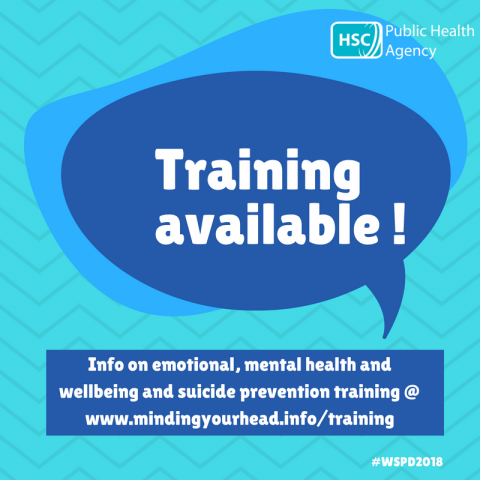PHA increasing understanding of mental health through training

As World Suicide Prevention Day approaches the Public Health Agency (PHA) is raising awareness of the training opportunities available in mental and emotional wellbeing and suicide prevention.
Almost 15,000 participants[1] received PHA-funded training in mental and emotional wellbeing and suicide prevention last year.
The PHA commissions a range of training programmes which are delivered across Northern Ireland, which range from raising awareness of mental health and wellbeing to providing advice on crisis intervention.
“Improving mental health and reducing the prevalence of suicide are very important issues for the Public Health Agency, so we are working with local communities and organisations across Northern Ireland to deliver training and education to make a real difference,” said Helen Gibson, Regional Co-ordinator for Mental and Emotional Wellbeing and Suicide Prevention Training with PHA.
“These courses aim to increase understanding of mental health, promote positive self-help strategies and raise awareness of the many available sources of help and support. They also enable people to feel able to raise the topic of mental health, an issue that still carries a significant stigma in our community
“Courses are also available to help build knowledge about the signs and symptoms of poor mental health. Being able to ‘sign post’ to appropriate help and support, as well as supporting people who are experiencing suicidal thoughts, can literally provide life-saving help to someone in crisis.”
The Mental and Emotional Wellbeing and Suicide Prevention Monitoring Report shows that between April 2017 and March 2018, 14,932 participants attended and completed their training in a chosen mental health and or suicide prevention area.
Courses supported by the PHA include Applied Suicide Intervention Skills Training (ASIST), Mental Health First Aid NI (MHFA) and safeTALK. Available courses also include mental health awareness for teenagers.
The length of the courses varies depending on the level of training involved. Some courses are delivered over a few hours where others may last a couple of days.
Helen Gibson said:
“Mental ill-health can affect anyone, so by training members of the community to be aware of what to look out for and to know what to do in circumstances where people close to them are experiencing a mental health problem, we can together provide better support. I would encourage people who are interested to find out more about the training available in their local area.”
Participants in the courses over the past year have come from community and voluntary organisations, churches, health and social care trusts, GPs, education and sporting organisations, the private sector and the public sector.
For further information on emotional, mental health and wellbeing and suicide prevention training courses delivered in Northern Ireland please, visit www.mindingyourhead.info/training
The Mental and Emotional Wellbeing and Suicide Prevention Monitoring Report 2017/18 is available online at http://pha.site/3f5d
- In total for 2017/18 there were 14,932 participants that have attended and completed training in a chosen mental health and/or suicide prevention area. NB: participants may have attended more than one course through the year.
